Olympia Leisure Centre and Windsor Park Storm Sewer Project (2017)
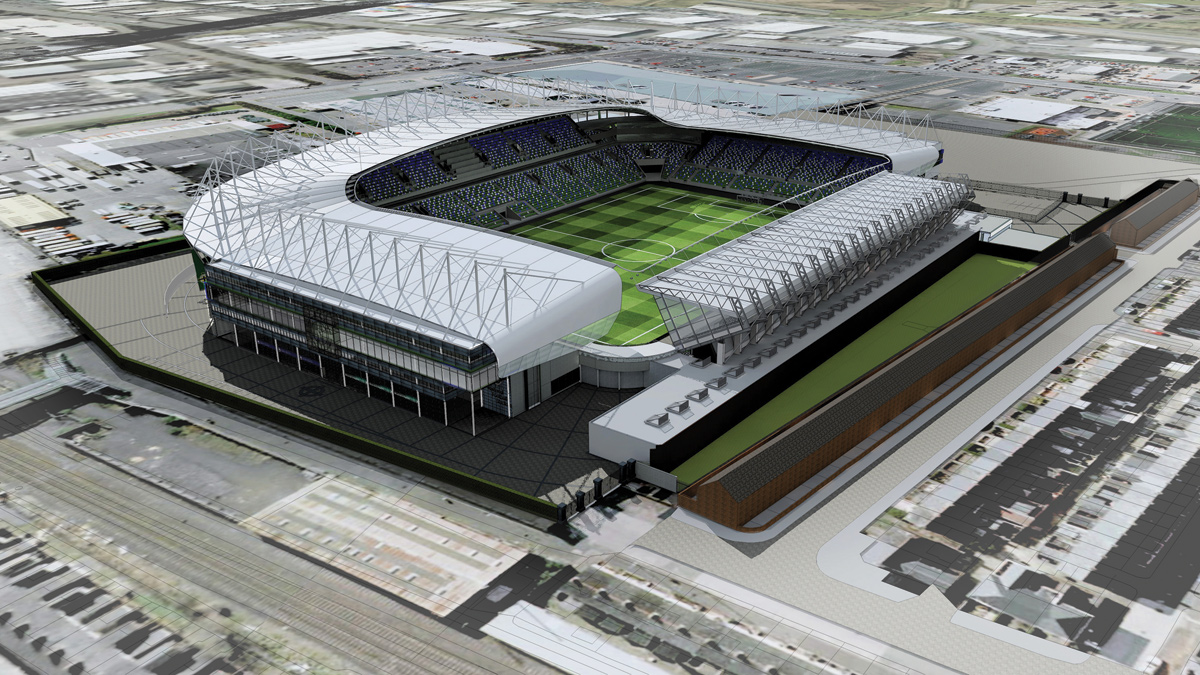
National Football Stadium - Courtesy of Hamilton Architects
The existing combined sewerage system in the area did not have the capacity to take the increase in flow from these two major developments; therefore a new storm sewer was required. The project has also given NI Water the opportunity to update the 1930s combined drainage system in the area by the removal of significant volumes of storm water from the existing sewer. This will reduce the risk of out-of-sewer flooding which can result in overflows to local watercourses and environmental pollution. The new storm sewer has been laid from the Windsor Park and Olympia sites, along Olympia Drive and Donegall Avenue, discharging into the Blackstaff Relief Culvert at the junction of Donegall Avenue and Broadway.
The enabling works stage
The enabling works stage involved one of the framework contractors completing site investigatory works to identify the risks associated with the scheme. A number of these risks included constraints due to poor ground conditions, reinforced concrete roads structures, location of existing utility services, which included numerous high voltage electric cables along with the associated traffic management issues.
The site investigation works allowed optimisation of the best construction technique for the installation of the storm sewer, in order to achieve the best value for money. On completion of the investigatory works, a final design was confirmed which included sections of both open cut and trenchless techniques. A desktop estimate was then provided to NI Water by Atkins Consulting Engineers who were the designers and project managers. This enabled NI Water to estimate the project budget and proceed to tender within the relevant framework lot.
The procurement stage
In order to establish accurate costings a mini-competition was undertaken among the eight contractor providers on the NI Water Integrated Framework For Small Sewers, Minor Works. AG Wilson Civil Engineering returned the best commercial response and following a successful post tender interview, the firm was awarded the contract in March 2016. This enabled NI Water to advise the Irish Football Association and Belfast City Council of costs in excess of the NI Water reasonable cost allowance subsidy. Both Developers accepted the costs and agreed to contribute towards the scheme.
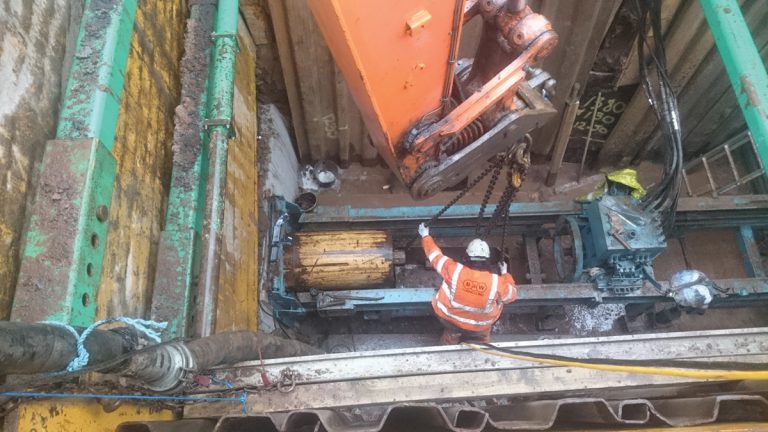
Donegall Avenue auger boring – Courtesy of Atkins
The construction stage
The NEC 3 Engineering & Construction Short Contract was deemed appropriate for this type of project and delivered in line with expectations. Work on the project commenced in August 2016 with early stakeholder involvement. This included resident engagement meetings, which required a close working relationship with the project team comprising NI Water (client), Atkins (consultants) and AG Wilson Civil Engineering (principal contractor) to ensure successful delivery and management of the project.
NI Water invited local elected and community representatives as well as residents from the local community (within a catchment of approximately 2000 properties) to come along to a public information event. This gave them an opportunity to find out more about the overall project, the proposed construction works and raise any queries or concerns.
As the work being undertaken was in close proximity to properties, as a standard precautionary measure an independent structural engineering company was appointed by NI Water to carry out structural inspections/surveys on approximately 220 homes before the work commenced and following completion.
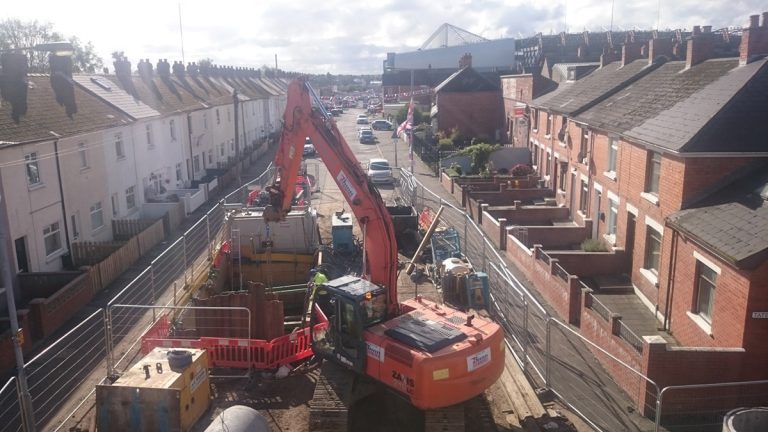
Donegall Avenue trenchless works – Courtesy of NI Water
The project involved laying approximately 640m of new storm sewer within the Olympia Drive and Donegall Avenue area of Belfast. In order to allow the work to be carried out safely it was necessary to close Olympia Drive and Donegall Avenue. To minimise disruption to local residents and businesses these roads were closed in short sections as the work progressed and local diversions were in place throughout the construction. The contractor liaised directly with local businesses within these road closure areas to ensure access arrangements for customers and deliveries were agreed in advance.
Throughout this project there was large emphasis placed on providing high levels of customer care, which included issuing monthly newsletters to update on progress and proposed work, holding monthly drop-in sessions in a local community centre, and providing key contact details of the project team to the local community so to minimise general disruption during the works.
Customer letter drops with specific project details were circulated within the vicinity of each new works area to ensure that all residents within the area were aware of when and why the work was taking place. In addition, the project team undertook early stakeholder involvement on a regular basis with elected representatives, businesses, community groups and statutory authorities including Transport NI and other utility companies.
Programmed works
The 10-month construction programme commenced on site in mid-September 2016 and was substantially complete in mid May 2017, 2 weeks ahead of programme.
Phase 1: Windsor Park Development – Donegall Ave – Sept 2016-March 2017
This phase of the works included laying 390m of 900mm diameter storm sewer to accommodate a peak design flow of 347.2 l/sec. The construction techniques deployed included both open cut and trenchless works at depths up to 6m along Donegall Avenue. There was also a bridge crossing under the Tates Avenue Bridge, where working space was restricted. The pipe route was selected to avoid the bridge abutment foundations and the thrust and reception pits were sited to avoid underground and overhead utility services.
Donegall Avenue is a busy arterial route into Belfast City Centre which required close liaison with Transport NI for road closures and diversion routes, Translink in relation to the bus route affected and local business’s and residents to ensure disruption in the area was kept to a minimum.
Phase 2: Olympia Leisure Development – Olympia Drive – April 2017-May 2017
This phase of the works included laying 250m of 600mm diameter storm sewer to accommodate a peak design flow of 233.5 l/sec. The construction technique was open cut works at depths up to 5m along Olympia Drive in a narrow urban street close to Belfast City Centre.
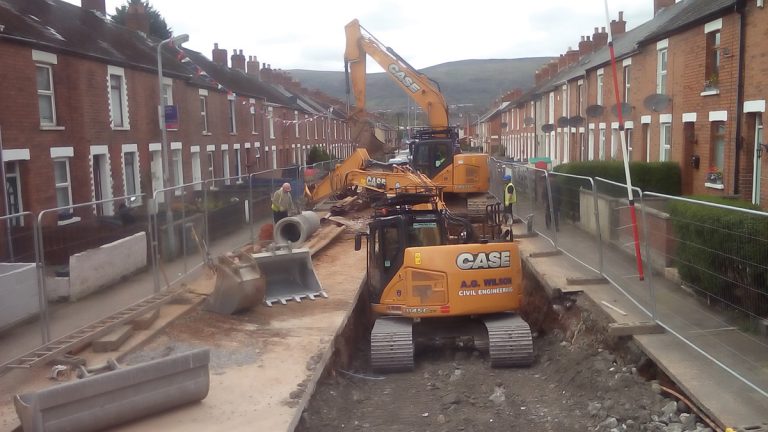
Olympia Avenue open cut works – Courtesy of Atkins
Temporary trench support mainly included trench boxes and trench sheeters were utilised around service crossings. It was necessary to replace a short section of the existing combined sewer in Olympia Drive as it deviated into the trench of the new storm sewer.
Throughout both phases of the works monthly ’drop in’ sessions were held and newsletters issued to the local residents and key stakeholders which kept them informed of current and planned works as well as any possible disruption.
There have been no major issues or risks raised by residents that the project team have not been able to mitigate or proactively manage which is a great achievement by the project team on such a challenging project.
Quality throughout this project was assured by adherence to NI Water Standard Specifications and the contract specific specification. Approximate materials measured included:
- 2,000m2 concrete road reinstatement (54 lorry loads/440m3).
- Waste disposal (6,800m3/14,960 tonne).
- Pipe bedding (406.2m3/894 tonne).
- Stone backfill (6,044m3/13,296 tonne).
The project has been completed with zero defects and all infrastructure laid has been tested and deemed fit-for-purpose. Therefore it can be concluded, that this project has been managed and supervised to a very high standard, and with the application of NI Water processes, procedures and standards a successful outcome achieved with no significant issues arising.
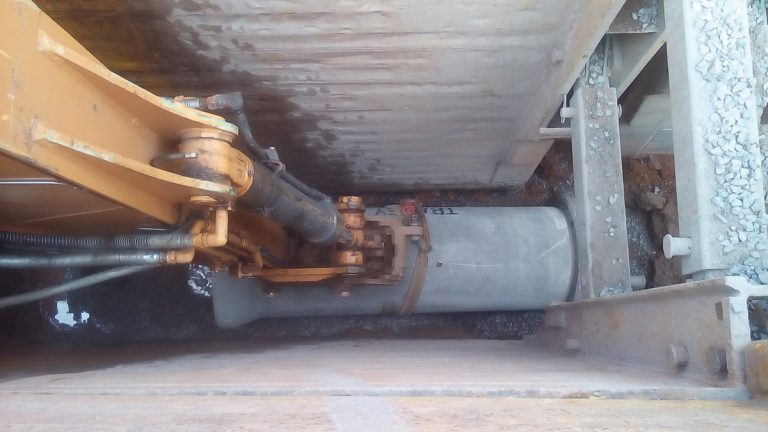
Olympia Avenue pipe installation – Courtesy of Atkins
Conclusion
The work being carried out will facilitate the redevelopment of the new Olympia Leisure Centre and Windsor Park Stadium. Windsor Park’s capacity has risen from around 12,000 to 18,000 following the £26m redevelopment. Olympia Leisure Centre is currently undergoing a £19m regeneration that will include a new play space, target area, 3G pitches in addition to extensive landscaping of the complex.
The new storm sewer will provide increased capacity in the existing combined sewer network and reduce the risk of out of sewer flooding which can result in overflow to local watercourses. The new storm sewer will discharge to the Blackstaff relief culvert at the junction of Donegall Avenue and Broadway.
Approximately 71,100m2 of existing impermeable area from both developments drain to a 600mm diameter combined sewer for pumping from Glenmachan Street WwPS or spilling to the Belfast Tunnel and forward pumping to treatment with spills directly to the Belfast Lough.
The new 600/900mm diameter storm has separated approximately 580 litres/seconds from the combined sewer which will reduce local operating costs for NI Water.
The project greatly contributes towards the sustainable urban drainage (SuDs) programme aimed at removing 19 hectares of impermeable area by end of regulatory period in 2021.
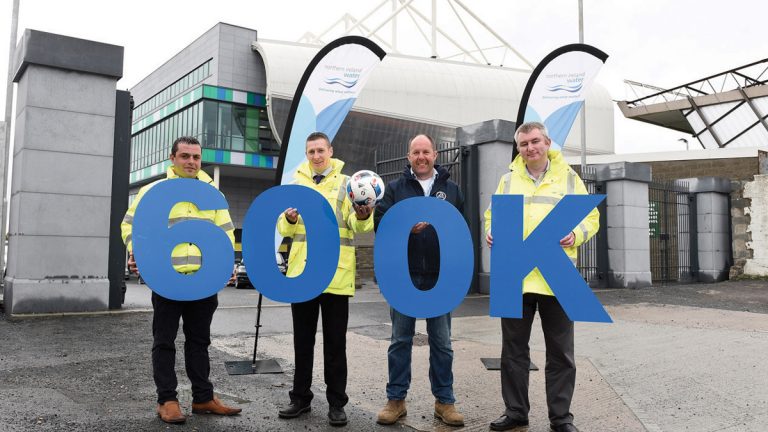
Team photo marking the completion of this essential new storm sewer for Windsor Park & Olympia Leisure Centre. The programme of work will also improve the sewerage infrastructure in the area, increasing the capacity of the existing combined sewers, particularly during periods of heavy rainfall – Courtesy of NI Water
NI Water is grateful to the Local Area residents, their representatives and the general public for their ongoing cooperation, patience and understanding throughout this programme of essential works which with benefit both developments and the local community.






